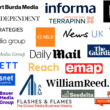The tectonic plates of newspaper-land are shifting. First, comes Rupert Murdoch’s brought-forward demerger of News Corp from what will become the Fox Corp TV and film business – ahead of next year’s UK criminal trials over phone hacking and corruption. (En passant: expect an Autumn 2013 re-run of the bid for BskyB, Europe’s most profitable TV group – which would become Fox Corp’s largest business).
Next, it may be time for consolidation among the Flashes & Flames “beacon” newspaper groups (see http://wp.me/p1AJfY-H4). These four progressive, front-foot businesses (in order of reinvention success) are:
1. Axel Springer, of Germany: international and digital growth from still-strong newspaper base. 35% of €3bn revenue is digital.
2. Daily Mail & General Trust (DMGT), of UK: high-growth, high-margin business media more than offsetting newspaper decline. €2.5bn revenue.
3. Schibsted, of Norway: dramatic digital growth in 20 international markets. 25% of €2bn revenue from online free classifieds.
4. New York Times, of US: 566,000 ipad and hard copy subscribers for NYT and Int. Herald Tribune – 11% up on last year.
At least for now, the three European companies can stop wondering whether they should bid for one or all of the News Corp newspapers – and concentrate on other strategic options. Stand by for a game-changing deal between two of the most successful newspaper dynasties. There is rising speculation in London and Berlin of a possible ‘merger’ of DMGT’s Associated & Northcliffe Media (ANM) newspaper and consumer online operations – with Axel Springer.
Such a deal would resolve the DMGT consumer-business dichotomy, transform its overall valuation – and create two world-beating digital groups in business and consumer media. The instant result would be:
- Axel Springer becomes leader in online classifieds – with dominant hard copy and digital positions in Europe’s two largest media economies, the UK and Germany. Mail Online would spearhead international expansion, especially in the US. The Axel Springer-ANM combination would be transformational.
- DMGT becomes a premium-rated, pure-play business media group with the scope for international (especially Asian) expansion beyond current 92% dependence on the US and UK. It could acquire the remaining 30% of the gilded Euromoney Institutional Investor plc, and do further deals with UBM, Informa, or Pearson.
DMGT last month divested its 92 regional newspapers into the newly-established ‘consolidator’ Local World, in which it will hold a 38.7% share. Its ANM consumer media subsidiary now comprises:
- Daily Mail and Mail on Sunday, the 2m-selling midmarket tabloids that are the UK’s second largest – and most profitable -dailies. Achieved a market-beating revenue decline of ‘only’ 3% during the past year. Circulation revenues actually increased.
- Metro, the highly successful 1.3m free tabloid – the UK’s fourth largest newspaper. Now highly profitable.
- Mail Online, the world’s largest online news site, with 100m unique browsers per month. Pushing towards profitability.
- Evenbase – the digital recruitment brand including Jobrapido search engine, in Europe, North America, and AsiaPacific.
- Jobsite -one of the three leading online recruitment services in the UK, including 500 regional web sites.
ANM has revenue of £848m, operating profit of £78m, and employs almost 4,000 people. The recent DMGT financials highlighted the way its US and UK business-to-business operations account for an increasing share of group profits – and all the growth. During the past year (excluding the divested regional newspapers), business media accounted for 51% of DMGT revenues and 79% of operating profits – and it’s only going one way.
In spite of strongly profitable development of the Metro tabloid, dramatic international growth in Mail Online, and a much better-than-market performance by the Daily Mail and Mail on Sunday newspapers, DMGT’s traditional consumer-facing operations are dragging down the group’s value. Its stockmarket price-earnings ratio of 10 times – half that of Reed Elsevier – speaks for itself. And investors are getting restive. A Daily Mail deal with Axel Springer would deliver huge benefits while allowing Lord Rothermere (Jonathan Harmsworth) to retain a stake in his family’s newspaper legacy – a similar approach to News Corp’s forthcoming de-merger. Everyone’s a winner.
The ANM turnover and profit are roughly equivalent to 30% and 15% respectively of Axel Springer AG. So it is thought likely that DMGT could secure some 20-25% of the enlarged €4bn+ turnover company, giving its shareholders (including Rothermere’s 40% family holding) a continuing stake in one of Europe’s most attractive consumer media businesses. The deal would yield big gains in the UK for Axel Springer where the combination of its Stepstone/ TotalJobs and DMGT’s EvenBase/ JobSite would create clear market leadership. The Mail newspapers would also give Springer a broad UK platform for growth, after abortive pitches over the past 15 years for the Daily Mirror, Daily Telegraph and The Independent. It acquired TotalJobs from Reed Elsevier last year for €132m.
Despite Schibsted’s fair claim to being the world’s smartest newspaper group (and still the online classified leader), Axel Springer has been using its muscle (and profit growth in Europe’s strongest economy) to catch up. Last year’s record profit of €593m was 16% ahead of the previous year – and three times higher than 10 years before. Margins were a best-ever 19%. That’s not how it’s supposed to be for digitally-challenged newspaper groups. But, then, Axel Springer under CEO Mathias Doepfner is no ordinary newspaper group. The company operates newspapers, magazines and online in 36 countries. Its tabloid Bild is the biggest-selling newspaper in Europe with 3million daily sales and Fakt is similarly dominant in Poland, where is Springer now the online market leader.
The company’s Chief Finance Officer was conveniently in London this last week to tell would-be investors about achievements matched by few newspaper companies. Springer’s percentage of digital revenues had increased from 2% in 2004 to 35% in 2012. This is a sparkling story of the impressive exploitation of the company’s Bild which is out-performing its newspaper peers around the world – in print and online; and highly-strategic digital acquisitions in Poland, France, Belgium, and the UK.
The Springer CFO underlined how the company has used partnerships and joint ventures to expedite the growth. The private equity firm General Atlantic is a 30% investor in Springer’s online classified business; and much of its burgeoning media activity in Central and Eastern Europe (including Poland, Czech, Slovakia, and Serbia) is jointly owned with Switzerland’s Ringier Group. Before that, the company’s magazine publishing was powered by highly effective licensing deals around the world. The message is clear: Axel Springer is a good partner.
More than that, the 66-year-old German company has telling similarities with DMGT: The two family-controlled, listed companies share a mindset and are similarly innovative, adventurous but solidly profitable, cash-generative and under-leveraged. It is 40 years since the German founder gained a Europe-wide reputation for right wing politics. Today, Axel Springer AG is a company with its imposing headquarters alongside what was once the Berlin Wall, which did more than most to promote the country’s reunification, and is a fierce supporter of Israel. Doepfner, like Herr Springer before him, describes himself as a “non-Jewish Zionist”. The CEO’s immersion in American business (where he has worked, studied and is now on the board of Time Warner) has given his leadership an impressive international style that has not always been fashionable in corporate Germany.
The Harmsworth and Springer families have been cross-border cousins (sort of) for at least the 60 years since Axel Springer created Bild as a clone of the then Harmsworth-owned Daily Mirror. Even before that, the colourful Princess Stephanie von Hohenlohe (1891-1972) formed her own joint venture, being romantically involved both with Axel Springer and the first Lord Rothermere (the current DMGT chairman’s great grandfather).
Axel Cesar Springer (who died in 1985, aged 73) would be proud of the achievements of his company under the chairmanship of Friede, his fifth wife and children’s former nanny whom he had married seven years before his death when she was 36. Perhaps he would be surprised.
In 2012, the company celebrated the centenary of the newspaperman’s birth and the 60th anniversary of Bild with a distribution of 41million copies to every German household. It was a popular, eye-catching idea but also a profitable one that attracted almost €40m of advertising revenue. This is the sparky, born-again company which published an ‘artist edition’ of its broadsheet Die Welt, designed by artists, and 3D editions of Bild.
Coupled with an earnings revival beyond any other Western newspaper group, the 21st century Springer flair will help persuade the DMGT Board and its controlling family it is a company with which they can happily and profitably do longterm business. The two companies were neck-and-neck losers to the Barclay brothers in the 2004 auction for the Daily Telegraph. And their respective flagship newspapers share a right-of-centre stridency. The Bild attacks on the Euro-profligacy of Greece (above) came straight from the Daily Mail songbook.
Although the ultra-smart, urbane musicologist and former editor of Die Welt, Mathias Doepfner, is not quite Springer family, he and Jonathan Harmsworth share a similar role as new-generation heirs to their private-public businesses.
An Axel Springer-ANM deal would be a hands-down money-spinner for Harmsworth. It would, ironically, also put him in a similar position to his nemesis Rupert Murdoch: major investments in two separate media groups, which would be worth substantially more than the status quo. The emotional sweetener for a deal, involving the sale of his birthright, could be some kind of joint holding company in the UK or even Anglo-German cross-shareholdings. Whatever the mechanism, the creation of separate European leaders in consumer and business media – and a 50% re-rating for the B2B-only DMGT – may represent an irresistible prize for all shareholders.
Of course, the chatter of management consultants and investment bankers might just bring Schibsted into the discussions. The Oslo-based operator is also an ambitious, smart and family-friendly would-be partner which, like Springer, wants to become world champion in digital classifieds. Schibsted is currently the online leader among our “beacon” newspaper groups. Having swept the mighty ebay out of France, it knows a bit about winning in auctions. The game-changing fun is about to begin.
www.flashesandflames.com




